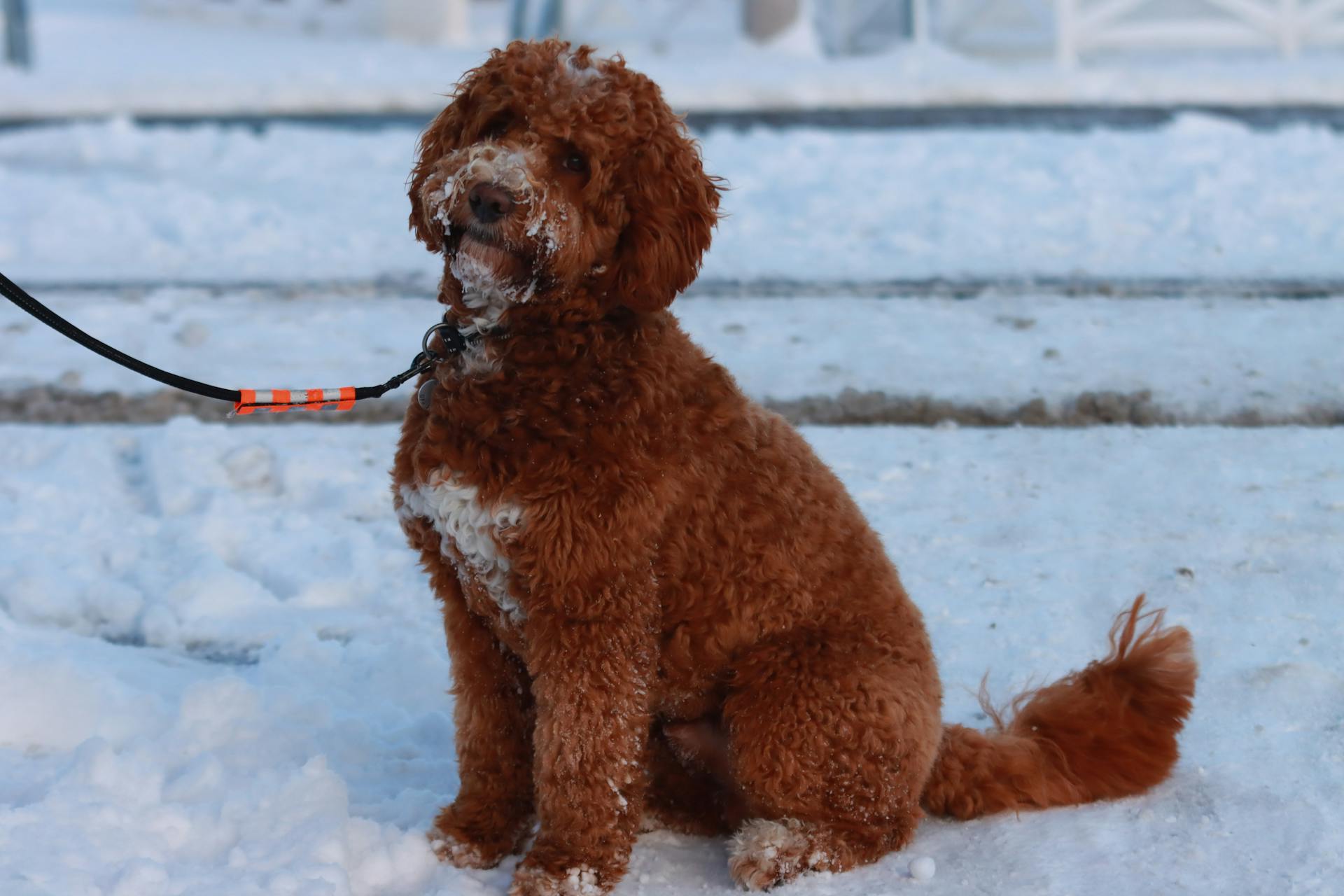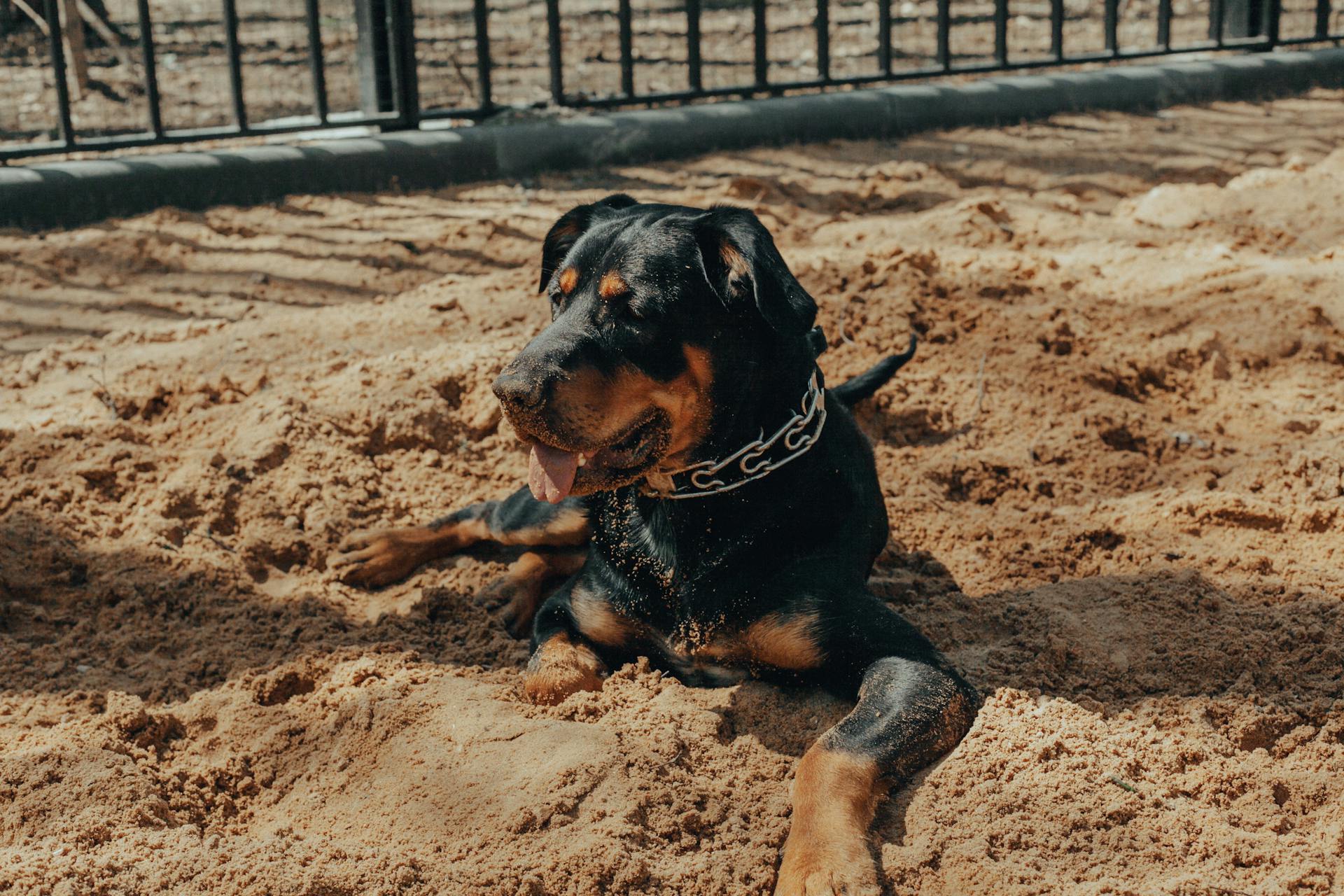
Mini Goldendoodles are a cross between a Miniature Poodle and a Golden Retriever, making them a popular choice for families and first-time dog owners.
They typically weigh between 15-30 pounds and stand between 14-18 inches tall at the shoulder.
Mini Goldendoodles are known for their friendly, outgoing personalities and are often described as "velcro dogs" because of their love of human interaction.
Their intelligence and trainability make them a breeze to teach basic obedience commands.
Physical Characteristics
Mini Goldendoodles typically weigh between 15 and 30 pounds, with some adults reaching up to 40 pounds. Their height can range from 14 to 18 inches at the shoulder.
Their coats can be a combination of their parent breeds' characteristics, often featuring a thick, soft texture and a low-shedding or hypoallergenic quality.
Care and Feeding
Mini Goldendoodles are intelligent and eager to please, making them a perfect combination for first-time or experienced trainers. Positive reinforcement is key when training, as harsh corrections could damage their confidence.
They require daily exercise, with 20 to 30 minutes of physical activity enough to keep them from becoming bored. Swimming is an excellent option, given their love of water.
A mini Goldendoodle's diet should include a high-quality protein source, with three to four meals per day for puppies and one or two meals for adults. Be mindful of treats during training, as overfeeding is a concern.
Grooming Needs
Grooming is an essential part of caring for your mini goldendoodle. Regular grooming helps prevent tangles, reduces shedding, and keeps their coat looking its best.
You'll need to brush your mini goldendoodle's coat about once a week, but this can be more often if you choose not to clip their hair. Brushing their teeth at least two or three times a week is also crucial to prevent tartar buildup and gum disease.
Bathing your mini goldendoodle should be done only when necessary, as over-bathing can strip their coat of its natural oils. Trimming their nails once or twice a month will help prevent painful tears and other problems.
Related reading: When Do Goldendoodles Lose Their Puppy Coat
Their floppy ears need regular checks for redness, discharge, or odors, which could indicate an infection. Brushing your mini goldendoodle's coat and checking their ears should be done gently and carefully to prevent causing them stress.
As a responsible owner, it's essential to get your mini goldendoodle accustomed to being brushed and examined from an early age. This will help them become more relaxed and cooperative during grooming sessions.
Feeding
Feeding your Goldendoodle is crucial for their overall health and well-being. A high-quality dry food is recommended, and the daily amount depends on size, age, build, metabolism, and activity level.
Divide their daily food into multiple meals to prevent overeating and maintain a healthy weight. A highly active dog will need more food than a couch potato dog.
Measure your Goldendoodle's food and feed them twice a day to keep them in good shape. Leaving food out all the time can lead to overeating.

A Goldendoodle should have a visible waist, and their ribs should be easily felt but not seen without pressing hard. If you can't feel their ribs, they need less food and more exercise.
Feeding your Goldendoodle several small meals per day can help prevent gastric torsion or bloat, a trait that can be passed on to their offspring.
Treats are ideal for training, but be mindful of the calorie intake and don't overfeed them.
Care
Taking care of your Goldendoodle or Mini Goldendoodle requires a combination of exercise, socialization, and attention to their grooming needs.
They need daily exercise, around 20 to 30 minutes, to prevent boredom and keep them happy and healthy.
Socialization is key, especially for young puppies, to ensure they grow into well-behaved adults.
Mini Goldendoodles love to be with their pack, so they shouldn't be left alone for long periods or stuck in a kennel.
To prevent separation anxiety, which can lead to destructive behavior, keep them active and include them in family activities.
They also need regular grooming, including brushing their coat once a week, trimming their nails once or twice a month, and brushing their teeth at least two or three times a week.
And, because they have floppy ears, check them regularly for signs of infection like redness, discharge, or odors.
Personality and Temperament
Mini goldendoodles are affectionate animals that love a good cuddle, as well as spending plenty of time with their family. They often express affection through their playful natures, whether it's jumping, licking, or snuggling up to their pet parents.
They are highly social and friendly hybrid breeds that thrive on human interaction. In fact, they can develop separation anxiety if left alone for too long, so it's essential to spend quality time with them.
Mini goldendoodles are known for being gentle and patient, making them a wonderful family companion, especially for families with children. However, early socialization and obedience training are crucial to ensure they behave appropriately around kids.
Their playful and energetic personalities make them a great choice for families who love to play and be active. But, they also have a calm and well-behaved side, as long as you properly train your pup.
Mini goldendoodles are eager to please and love being in close contact with people at all times, which makes them an ideal family pet. They'll also get along well with any other pets you have, including other dogs.
They are highly trainable and intelligent, which makes them easy to train, even for first-time dog owners. However, they are sensitive to tone of voice, so calm, positive instructions will get the most out of them.
You might like: Training Goldendoodles
Health and Behavior
Mini goldendoodles are generally a healthy breed, but like any dog, they can be prone to certain health issues. Hip dysplasia is a common problem that can cause pain or lameness, and can be prevented with regular vet visits and joint supplements.
Some mini goldendoodles may also develop patella luxation, which is a condition that affects the joints and can cause pain when walking. Maintaining your dog's ideal weight and feeding them high-quality food can help prevent this.
Progressive retinal atrophy is another condition that can affect mini goldendoodles, particularly those with a golden retriever heritage. This condition involves a gradual deterioration of the retina, which can cause night blindness and loss of daytime vision. Regular vet visits are the best way to prevent and detect this condition.
Some other health issues that mini goldendoodles may develop include cataracts, hypothyroidism, Addison's disease, and ear infections. It's essential to be aware of these potential health risks and take preventative measures to keep your mini goldendoodle healthy.
Here are some common health issues that can affect mini goldendoodles:
- Hip dysplasia
- Patella luxation
- Progressive retinal atrophy
- Cataracts
- Hypothyroidism
- Addison's disease
- Ear infections
Exercise Needs
Regular physical activity is essential for maintaining a healthy weight, with adults needing at least 150 minutes of moderate-intensity exercise or 75 minutes of vigorous-intensity exercise per week.

Exercise can also help improve sleep quality, with studies showing that regular physical activity can increase deep sleep by up to 30% and reduce sleep latency by 15 minutes.
Engaging in physical activity can reduce symptoms of anxiety and depression, with a study finding that exercise can decrease symptoms of anxiety by up to 50% in just a few weeks.
Aerobic exercise, such as running or cycling, can improve cardiovascular health by lowering blood pressure and increasing blood flow to the muscles.
Resistance training, such as weightlifting, can help build muscle mass and bone density, reducing the risk of osteoporosis and fractures.
Incorporating physical activity into daily routines can be as simple as taking a 10-minute walk after meals or doing a few jumping jacks during commercial breaks while watching TV.
Do Smell?
Mini Goldendoodles have a mild to moderate odor, but it's not overly smelly. A good grooming routine is essential in keeping any odors at bay.

Their natural smell can vary, but with proper care, they can stay smelling sweet and cuddly. A healthy lifestyle, right diet, and lots of love and care will help minimize any odors.
If you're concerned about a Mini Goldendoodle's smell, research different breeds and visit them in person to get a sense of their natural odor. Mini Goldendoodles are known for their mild, or even non-existent, odor.
Explore further: Do Goldendoodles Stink
Health and Behavior
Mini Goldendoodles are generally a healthy breed, but like any dog, they can be prone to certain health issues. These can range from minor concerns like allergies to more serious conditions like hip dysplasia.
Hip dysplasia is a common issue in Mini Goldendoodles, where the femur doesn't align properly with the pelvic socket of the hip joint, causing pain or lameness. Regular vet check-ups and joint supplements like glucosamine and omega-3 oils can help prevent future pain.
Patellar luxation is another issue that can affect Mini Goldendoodles, where abnormal formations of the joints cause pain when walking. Maintaining a healthy weight and feeding high-quality food can help prevent this condition.

Progressive retinal atrophy is a serious condition that can cause night blindness and loss of daytime vision, but it's an inheritable condition, so regular vet visits can help detect it early.
Other health issues that can affect Mini Goldendoodles include cataracts, hypothyroidism, Addison's disease, and ear infections. These can often be treated with medication, supplements, and diet changes.
To keep your Mini Goldendoodle healthy, make sure to choose a reputable breeder, provide regular exercise and mental stimulation, and schedule regular vet check-ups. With proper care and attention, your Mini Goldendoodle can live a long, happy, and healthy life.
Here are some common health issues that can affect Mini Goldendoodles, along with some preventative measures:
Are Aggressive?
Mini goldendoodles are not aggressive, they're known for their friendly and playful natures.
However, any dog that isn't socialized or given obedience training can develop behavioral issues. These issues can be remedied with positive reinforcement and reward-based training.
A fresh viewpoint: Do Mini Goldendoodles Have Health Issues

It's worth noting that mini goldendoodles nip or chew during their teething stage, which is a normal part of their development. This doesn't mean they're aggressive, just that they need some patience and guidance.
If you're planning to introduce your mini goldendoodle to other animals, socialization is key. They're generally good around cats and other dogs, but it's still a good idea to introduce them properly, especially while they're still a puppy.
Curious to learn more? Check out: Are Mini Goldendoodles Good Dogs
Do Doodles Bark?
Mini goldendoodles are not known for their vocality, but they may bark at the occasional stranger or if they want your attention.
Generally, doodles are not loud or excessive barkers, but they do make noise.
They may bark to alert you to something, like a stranger at the door, but it's not a constant sound.
With proper training and socialization, doodles can learn to bark less and be more calm.
Mini goldendoodles, in particular, are a great option for those who don't want to deal with excessive barking.
Take a look at this: Do Goldendoodles Bark a Lot
Living with a Mini Goldendoodle
Mini goldendoodles are highly patient and gentle, making them a wonderful family pet, especially with children of all ages.
They thrive in homes with other dogs and pets, but it's essential to properly socialize them from puppyhood to ensure they get along well with others.
Mini goldendoodles need at least 20 to 30 minutes of exercise each day to stay active and prevent boredom.
They love to be part of the family pack and can develop separation anxiety if left alone for long hours or stuck in a kennel.
These dogs are great apartment dwellers due to their smaller size, low shedding, and quiet nature.
With their easy-going nature and trainability, mini goldendoodles are perfect pets for first-time owners who are willing to learn the basics of obedience training, socialization, and positive reinforcement techniques.
For another approach, see: Are Goldendoodles Good Running Dogs
Children and Pets
Living with a Mini Goldendoodle means creating a harmonious home for both your furry friend and your little ones. They're a fantastic family pet, especially with kids, and are loving and affectionate towards their family.
Mini goldendoodles are great around kids and love to play, which is perfect for rambunctious children. They're also easy to train, so you can teach them good manners even if you're new to pet parenting.
Teach your child how to approach and touch dogs, and always supervise interactions between dogs and young children to prevent any biting or ear or tail pulling. No dog should ever be left unsupervised with a child.
Proper socialization from puppyhood is crucial for your mini goldendoodle to behave appropriately around kids. Early socialization and obedience training are also important for ensuring they behave well around children.
Never approach a dog while he's eating or sleeping, and never try to take the dog's food away. This rule applies to all dogs, no matter how friendly they are.
Service Dogs
Mini goldendoodles make fantastic therapy dogs because they are soft, affectionate, and intelligent.
They are easy to train, which is a huge plus if you're looking for a dog that can provide support to others.
MGs are suited to work as therapy or emotional service animals, but they may not be the best choice for individuals who need stronger, sturdier animals for physical support or guidance.
This is because they are on the smaller side, which can make them less suitable for certain types of service work.
Benefits for New Dog Owners
Living with a Mini Goldendoodle can be a wonderful experience, especially for new dog owners. Mini Goldendoodles are great pets for first-time owners due to their easy-going nature.
Their trainability makes them a breeze to work with, even for those who have never had a dog before. Just remember to learn the basics of obedience training.
These dogs are playful and eager to please, which means they'll pick up commands quickly. With positive reinforcement techniques, you can develop a strong bond with your mini goldendoodle.
Socialization is also crucial for mini goldendoodles, as it helps them become confident and calm in new environments. By exposing them to various situations and people, you'll be giving them the best possible start in life.
Ownership and Maintenance
Miniature Goldendoodles are a relatively low-maintenance breed, but they still require regular grooming. They need to be brushed at least two to three times a week to prevent matting.
You'll also want to visit a professional groomer every two to three months to keep their coat looking its best. It's worth noting that while they're not 100% hypoallergenic, their Poodle heritage makes their coat more allergy-friendly than many other breeds.
Daily walks are essential for Miniature Goldendoodles, and they love socializing with other dogs and people during these walks. They're also natural water lovers and will appreciate any opportunity to go swimming.
See what others are reading: Can You Breed Two Goldendoodles
Apartment Dogs
If you live in an apartment, you'll want a dog that's comfortable in a smaller space. Mini goldendoodles make great apartment dogs due to their smaller size.
Their low-shedding coat is a bonus for apartment dwellers, as it means less hair to clean up.
Their quiet nature when it comes to barking is also a plus, as it won't disturb neighbors.
Suggestion: Mini Goldendoodles Good Apartment Dogs
Finding a Breeder
To find a reputable breeder, start by looking online, especially if they provide reviews or customer feedback. This can be a great way to get an idea of their reputation and the quality of their dogs.
You should look for a breeder who offers transparent documentation, such as vet records and genetic history. This shows that they are taking the health of their dogs seriously.
Proper socialization is also crucial for puppies, so make sure the breeder is doing this. A well-socialized puppy will be easier to integrate into your home.
Reasonable prices are another sign of a quality breeder. Be wary of breeders who charge significantly more or less than others in the area.
Here are some key things to look for in a breeder:
- Transparent documentation (e.g., vet records, genetic history)
- Proper socialization for puppies
- Reasonable prices
- Health guarantees
Are Purebred?
Mini goldendoodles are not purebred, they're a cross between a golden retriever and a miniature poodle, making them hybrid dogs.
Their parents, however, can be purebred themselves, which might seem confusing but just means their lineage is a bit more complicated than that of a traditional purebred dog.
In fact, both golden retrievers and miniature poodles can be purebred, with a long history of being bred for specific traits and characteristics.
This mix of purebred parents and hybrid offspring can make for some amazing pets, but it's essential to understand their unique needs and requirements.
As a responsible owner, you'll want to research and prepare for the specific needs of your mini goldendoodle, whether it's their grooming, exercise, or training needs.
Choosing the Right Dog
A mini goldendoodle is a good fit if you're comfortable with a medium-high energy dog and can provide at least 20 to 30 minutes of exercise per day.
If you're an allergy sufferer, a mini goldendoodle is a great option as they are hypoallenic.
These dogs are perfect for families who want a playful and affectionate companion.
However, if you have a slower lifestyle and prefer an animal that is relatively inactive, a mini goldendoodle may not be the best choice.
Mini goldendoodles from breeders can be expensive, so cost is an important consideration.
If you travel often or have to leave your dog at home alone a lot, a mini goldendoodle may not be the right fit.
In general, a mini goldendoodle is a wonderful breed to live with, especially for families who are willing to provide the right care and exercise.
Breed Maintenance
Miniature Goldendoodles require regular brushing to prevent matting, so set aside time each week to gently work out tangles with a soft-bristled brush.
You'll need to brush them at least two to three times a week. Their Poodle heritage means their coat can be more allergy-friendly than many other types, but they're not 100% hypoallergenic.
Daily walks are a must, and your Mini Goldendoodle will love socializing with other dogs and people along the way.
They'll also appreciate any opportunity to go swimming, which is a great way to get some exercise and have fun together.
Their nails will need to be clipped if they're getting too long, and their teeth should be brushed regularly to keep them healthy.
Be gentle with their sensitive skin and only bathe them when necessary using a mild dog shampoo.
Health and Longevity
Mini goldendoodles are known to live for around 10 to 15 years. This lifespan can be influenced by various factors, such as diet and exercise levels.
A well-balanced diet is essential for maintaining your mini goldendoodle's physical and mental health. This, in turn, can impact their overall longevity.
Regular exercise is also crucial for mini goldendoodles, as it helps keep them physically and mentally active. Aim for at least 30 minutes of exercise per day to keep your mini goldendoodle happy and healthy.
Genetics play a significant role in determining your mini goldendoodle's lifespan. Research the breed's parent breeds to get an idea of what to expect.
Proper care and attention can help ensure your mini goldendoodle lives a long and healthy life. With the right care, they can thrive and become beloved family members.
How Big Do They Get?
Mini Goldendoodles are a popular choice for many families due to their charming appearance and delightful personalities. They typically weigh between 15 to 30 pounds and stand around 13 to 20 inches tall.
Their size makes them a versatile choice for various living situations, including apartments and larger homes. Mini Goldendoodles are a cross between Golden Retrievers and Miniature Poodles, combining the best traits of both breeds.
They are known for their friendly, affectionate nature and are generally good with children and other pets. Approximately 80% of Mini Goldendoodles are reported to be low-shedding, which is beneficial for families with allergies.
Here's a rough estimate of the size range for Mini Goldendoodles:
Their moderate size and manageable exercise needs make Mini Goldendoodles an excellent fit for a variety of lifestyles. They require plenty of exercise and playtime to keep them happy and healthy, but they're not high-maintenance pets.
Mini Goldendoodles can vary in size depending on the height and weight of their parents. They're usually between 13-20 inches tall and weigh 20-40 pounds.
Consider reading: Mini Goldendoodles Size
Frequently Asked Questions
Do mini Goldendoodles ever calm down?
Yes, mini Goldendoodles do calm down over time, typically reaching a more docile state by three years old and becoming even calmer by the age of 10. With patience and proper training, they can develop into well-behaved and gentle companions.
Featured Images: pexels.com


